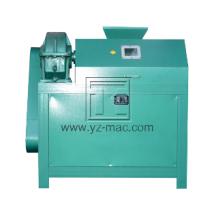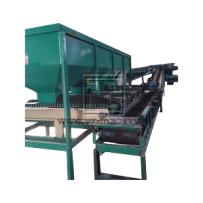Mechanical composting machine
A mechanical composting machine is a revolutionary tool in the realm of organic waste management. With its advanced technology and efficient processes, this machine offers a streamlined approach to composting, transforming organic waste into nutrient-rich compost.
Efficient Composting Process:
A mechanical composting machine automates and optimizes the composting process, significantly reducing the time and effort required for organic waste decomposition. It combines various mechanisms, such as mixing, aeration, and moisture control, to create an ideal environment for microorganisms to break down organic matter effectively. This results in faster decomposition and the production of high-quality compost.
Key Features of a Mechanical Composting Machine:
Automated Mixing and Turning: Mechanical composting machines utilize automated mixing and turning mechanisms. They ensure consistent blending of organic waste materials, promoting proper aeration and moisture distribution throughout the compost pile. This facilitates microbial activity and accelerates the decomposition process.
Temperature and Moisture Control: These machines often incorporate temperature and moisture sensors, allowing for precise control of the composting conditions. By maintaining optimal temperature and moisture levels, the machine creates an ideal environment for microbial growth and ensures efficient composting.
Odor Management System: Many mechanical composting machines are equipped with advanced odor management systems. These systems effectively neutralize or minimize unpleasant odors associated with composting, making them suitable for use in residential areas, institutions, and urban environments.
Monitoring and Control Systems: Modern mechanical composting machines feature sophisticated monitoring and control systems. These systems allow operators to monitor and adjust key parameters such as temperature, moisture levels, and mixing intensity, ensuring optimal composting conditions throughout the process.
Applications of Mechanical Composting Machines:
Municipal and Commercial Composting Facilities: Mechanical composting machines are extensively used in municipal composting facilities and large-scale commercial composting operations. These machines can handle significant volumes of organic waste, including food waste, yard trimmings, and agricultural residues. They streamline the composting process, improving efficiency and reducing the overall composting time.
Industrial and Institutional Waste Management: Mechanical composting machines are also suitable for managing organic waste generated by industries, institutions, and large-scale establishments. These machines efficiently process organic waste streams, reducing the waste volume and diverting it from landfills. They contribute to sustainable waste management practices and support circular economy initiatives.
Agriculture and Horticulture: Mechanical composting machines find applications in agricultural and horticultural operations. They help convert agricultural residues, crop waste, and organic by-products into valuable compost. The resulting compost enriches the soil with organic matter, improves soil structure, and enhances nutrient content, leading to healthier and more productive crops.
Waste-to-Energy Conversion: Some advanced mechanical composting machines can integrate anaerobic digestion or bioconversion processes. These processes convert organic waste into biogas or other forms of renewable energy. This innovative approach allows for the simultaneous production of compost and energy, providing a sustainable solution for organic waste management.
A mechanical composting machine offers a game-changing solution for organic waste management. With its efficient composting process, automated controls, and advanced features, it streamlines the composting journey, reducing time, effort, and resources.





